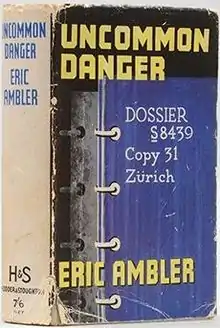Uncommon Danger
Uncommon Danger is the second novel by British thriller writer Eric Ambler, published in 1937. In his autobiography, Here Lies, Ambler explains the original title was Background To Danger, but his British publisher disliked the word 'background', so it was published in all English-speaking countries except the US as Uncommon Danger.[1]
 First edition | |
| Author | Eric Ambler |
|---|---|
| Language | English |
| Publisher | Hodder & Stoughton |
Publication date | 1937 |
Plot background
Bessarabia has been a contested area between Russia and Romania since the Great War. It contains important oil fields. A Russian double-agent (Borovansky) has stolen Russian plans for a possible attack on Bessarabia. If these are made public it will whip up anti-Russian feeling in Romania and help the Fascist Iron Guard to power, and help them make an alliance with Nazi Germany. The spy is taking them by train south into Austria.
Russian spies Andreas Zaleshoff and his sister Tamara are tipped off and commission a Spaniard, Ortega, to pursue Borovansky on the train, follow him to his hotel in Austria, and get the plans back.
Mr Balterghen of the British-based Pan-Eurasian Petroleum Company (PEPC) wants the question of the Romanian Concessions ie which external oil companies can exploit Romania's oil, to be re-opened so that PEPC can bribe its way to new concessions. He commissions one 'Colonel Robinson' to do this. Zaleshoff realises that 'Robinson' is the assassin and propagandist-for-hire Stefan Saridza, accompanied by his henchman Captain Mailler.
So, as the story begins, two separate sets of men are on the track of Borovansky and his photos.
Plot summary
The protagonist of the novel is Kenton, a down-at-heel freelance journalist who loses money gambling and takes the train to Vienna to borrow money from a man he knows there, Rosen, a Jew he helped escape Germany after the Nazis came to power. He is befriended on the train by a shifty foreigner, Sachs, who asks him to carry a package through customs on the Austrian border and who seems to be being followed on the train. When they arrive at Linz, Sachs asks Kenton to carry the envelope off the train and bring it to him at a particular hotel later that night. Kenton agrees for a price of 600 Marks.
When he arrives at the run-down hotel to hand over the envelope, Kenton finds Sachs murdered. He goes through Sachs's pockets and takes his wallet, just as someone comes up the stairs. Kenton escapes out the back, bumping into one of the gang searching for him, but managing to escape.
The reader realises that Sachs is Borovansky and Kenton is now in possession of military plans which could alter the course of European history. Worse, the police are informed of Sachs's death and Kenton finds himself wanted as a murderer with a price on his head. He is the classic Ambler protagonist, an innocent man on the run from the police while being shot at, kidnapped and beaten up by hard men from both sides.
Kenton is rescued by the Andreas and Tamara Zaleshoff, KGB agents, who manage to spirit him out of the country.
Ambler's view of big business
Ambler's pre-war novels contain numerous passages criticising big business and capitalism. This, combined with the prominent and friendly role played by KGB agents, led to suggestions that he was himself a left-wing sympathiser, claims he was later at pains to play down.[2][3]
It was difficult, Kenton had found, to spend any length of time in the arena of foreign politics without perceiving that political ideologies had very little to do with the ebb and flow of international relations. It was the power of Business, not the deliberations of statesmen, that shaped the destinies of nations. The Foreign Ministers of the great powers might make the actual declarations of their Governments' policies; but it was the Big Business men, the bankers and their dependents, the arms manufacturers, the oil companies, the big industrialists, who determined what those policies should be. Big Business asked the questions that it wanted to ask when and how it suited it. Big Business also provided the answers. Rome might declare herself sympathetic to a Habsburg restoration; France might oppose it. A few months later the situation might be completely reversed. For those few members of the public who had long memories and were not sick to death of the whole incomprehensible farce there would always be many ingenious explanations of the volte face – many explanations, but not the correct one. For that one might have to inquire into banking transactions in London, Paris and New York with the eye of a chartered accountant, the brain of an economist, the tongue of a prosecuting attorney and the patience of Job. One would have, perhaps, to note an increase in the Hungarian bank rate, an 'ear-marking' of gold in Amsterdam, and a restriction of credit facilities in the Middle-West of America. One would have to grope through the fog of technical mumbo-jumbo with which international business surrounds its operations and examine them in all their ghastly simplicity. Then one would perhaps die of old age. The Big Business man was only one player in the game of international politics, but he was the player who made all the rules.
Film adaptation
The novel was made into a film using the US title, Background to Danger, released in 1943. It was directed by Raoul Walsh and starred George Raft as the protagonist (renamed Joe Barton), Sydney Greenstreet as the antagonist, Colonel Robinson, and Peter Lorre as Zaleshoff.[4]
Editions
- Uncommon Danger, Penguin Classics, May 2009. ISBN 978-0141190341
References
- Ambler, Eric. Here Lies: An Autobiography (1985 ed.). London: Weidenfeld & Nicolson. p. 127. ISBN 0297785885.
- Hanks, Robert. "Socialism and Suspense". New Statesman. Retrieved 19 December 2014.
- Jones, Thomas. "Dangerous Games". The Guardian. Guardian Newspapers. Retrieved 19 December 2014.
- "Background To Danger". Internet Movie Database. Retrieved 19 December 2014.